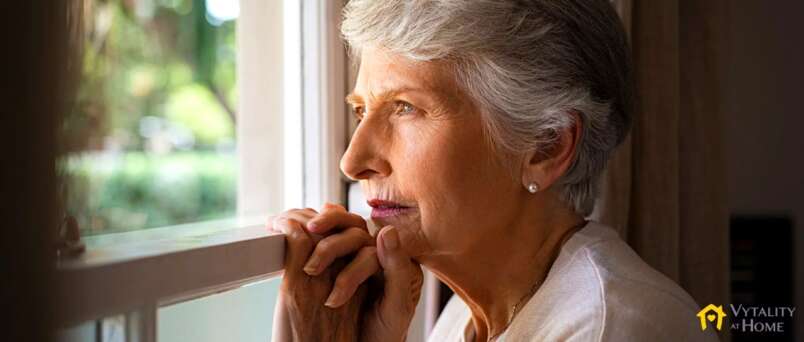Only the lonely: social isolation in seniors, and how to overcome it
Loneliness can be a major issue for seniors living in Canada, impacting on their physical and mental health. It doesn’t just affect Canadians or even seniors either; In November 2023, the World Health Organization declared that loneliness was a global public health concern.
Senior citizens are particularly vulnerable to loneliness, especially if they are living alone, have limited mobility, and/or chronic health issues. Even with the benefits of modern technology, they may spend days at home without meaningful contact with anyone. That in turn can lead to further health issues, both mental and physical.
As one emergency physician interviewed by Global News said:
“Social isolation and loneliness are as bad for your health as smoking 15 cigarettes a day.”
An aging population
Unless we act on the issue, loneliness will be likely to increase in the next decade. In 2024, one on four Canadians aged 65 and over live on their own. According to a Government of Canada “Social isolation of seniors” report:
“In 2038, there will be about 40 seniors for every 100 adult Canadians (between 18 and 64 years of age) — double the number of seniors in 2013.”
Some seniors are more at risk of loneliness and isolation than others:
“Canadian seniors who never married (29%) or were widowed (31%), separated or divorced (32%) were over twice as likely to report being lonely as seniors who were married or in a common-law relationship (13%). Canadian seniors in the lowest income group (25%) were much more likely to report being lonely than those in the highest income group (15%).”
However, as the Canada Coalition for Seniors’ Mental Health (CCSMH) points out:
“Feelings of social isolation or loneliness … isn’t an inevitable part of aging. Staying connected is important for maintaining mental and physical health as we age.”
Lessen loneliness with homecare
Before we all get too depressed, there is a simple solution for social isolation and loneliness: companionship. Many seniors living alone simply miss that in-person companionship. Homecare can resolve loneliness simply by providing someone to come in and discuss the latest news, or just having a chat around family and friends.
At Vytality at Home, your care is provided by the same caregiver, who comes as often as you require. With our three-hour minimum visit times, your caregiver can do more than just personal care, and always have time for tea and a chat.
If you or your loved one is lonely due to lack of social contact, our visits can brighten your day with a cheery smile, a little help around the house, a good chat, and time for some favourite activities too. We can also arrange transport to social activities, and accompany seniors or those requiring our care to appointments, special events or even just out for a coffee at a local coffee shop.
Contact us to discuss your requirements:
Is there a difference between social isolation and loneliness?
Employment and Social Development Canada defines social isolation as:
“A situation in which someone has infrequent and/or poor-quality contact with other people”.
In reality that’s just the tip of the iceberg. Socially isolated people of any age have few social contacts outside of family, have reduced or no social roles, few or no mutually rewarding relationships, and limited opportunities for contact with others.
The CCSMH goes further to the root of the issue:
“Social isolation can be understood as a measurable lack in the number of relationships a person has.
Loneliness is more subjective and can be understood as the feeling we get when our social relationships are lacking in terms of quality or quantity compared with what we expect them to be.”
A loneliness epidemic?
A 2024 study by the Women’s Age Lab at Women’s College Hospital in Toronto came up with action points the country needs to take to avoid what they called a “loneliness epidemic”.
“The epidemic of loneliness is spreading at an alarming pace in Canada, impacting older adults and other vulnerable and marginalized populations. A national action plan is needed for Canada to address the harmful impacts of loneliness and prevent its spread.”
Various other studies point to the same conclusions:
- In 2023, the Canadian Social Survey found that 39% of Canadians aged 65 years or more felt lonely at least some of the time.
- The National Institute of Ageing 2022 survey of Ageing in Canada revealed that 41% of Canadians aged 50 years and older are socially isolated.
Risk factors of social isolation amongst seniors
The National Seniors Council’s Report on the Social Isolation of Seniors identified factors that raised the risk of seniors becoming isolated. These included:
- living alone, especially after the death of a spouse
- aged 80 or over
- having chronic health problems
- less education
- no children and/or no contact with family
- no access to public transport / unable to drive anymore
- low income
- geographical location (e.g. urban, rural and remote)
- being a caregiver to another senior
Speaking your language
A report by the Government of Canada pointed to the issues of social isolation amongst immigrant and refugee seniors. These seniors may have moved to Canada to be with their children and grandchildren, but struggle to learn the language, cope with the climate, understand the culture or integrate into social groups. More than 70% of Canadian immigrants don’t speak English or French as their mother tongue.
Again, this is where we here at Vytality at Home can help. Once we’ve met you or your loved one and done an assessment, our team will match your requirements with a choice of caregivers – and that includes languages. Whilst we can’t guarantee we have a caregiver who can speak every language (we’re not that large a home care business!), we will always do our best and usually find a solution.
Reducing the five dimensions of social isolation
A report by Keefe and others recognised five dimensions of vulnerability to social isolation:
- Support for instrumental activities of daily living (IADLs)
- Emotional support
- Engagement in physical leisure activities
- Mastery and sense of life control
- Home living situation
At Vytality at Home, we help in all these five dimension as part of our home care provision. Here’s how:
- Support for instrumental activities of daily living (IADLs)
We help in areas you need it most, including personal care, toileting, bathing, dressing and more. We can also help with washing, cooking and light housekeeping. In other words, all the things you sued to do, but can’t manage to do easily anymore.
- Emotional support
This is key for all our caregivers. They genuinely care for our clients, and it shows.
- Engagement in physical leisure activities
When we first visit you in your home, we conduct a detailed assessment that becomes the core of your personalised home care plan. If that needs to include physical exercise, we can help, from gentle exercise routines as suggested by a physiotherapist to organising taxis to your favourite golf club!
- Mastery and sense of life control
This is one of our key principles – it’s your home, your care. With Vytality at Home simply call us to rearrange visits, increase your level of care, and more.
- Home living situation
As we age our homes might need extra additions and features to help us Age in Place. At Vytality at Home, we partner with a whole host of trades who specialise in senior home modifications, from grab rails and door ramps to walk-in showers and widened doors. We’ve vetted al our partners and negotiated special rates, so you get the work you need done by a qualified, experienced tradesperson at highly competitive rates.
Respite care for lonely family caregivers
People caring for others at home are also vulnerable to feelings of social isolation and loneliness. According to a leaflet from CCSMH:
“Most caregivers experience conflicting feelings of isolation, grief, compassion, joy and overwhelm as they provide care. A caring role can increase risk for depression and chronic illness, and lead to emotional and physical exhaustion.”
Respite care from Vytality at Home can give you the break you need and help improve your mental health and physical wellbeing. Call us to discuss your situation and needs, including respite care for those caring for loved ones with dementia.
You can help too!
You can help combat loneliness and social isolation with simple actions that cost you nothing but a few moments of your time. Why not befriend a local senior and offer them new opportunities for social interaction. You might:
- Ask them to Sunday lunch or a midweek dinner
- Pop in for a chat or talk over the fence!
- Offer a lift to church or clubs
- Invite them to your next family BBQ
- Offer to do a little gardening or grocery shopping for them
For more information on our home care and respite services in Calgary, or to discuss your specific requirements:




